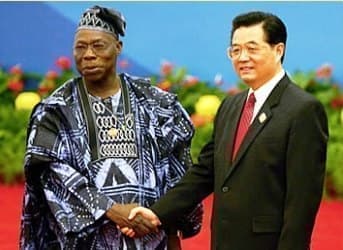African exports to China have increased six-fold since 2000 alone, the bulk of it in oil, and this year, China surpassed the US and Europe as Africa’s largest trading partner.
Starting from $11 billion in bilateral trade in 2000, Beijing racked up $160 billion dollars in trade with Africa by 2011, and for 2012
Chinese businesses have also invested some $15 billion in Africa in 2012 alone—that’s up from $500 million in 2002.
China is hot for Africa’s natural resources, which include 40% of the world’s total chromite deposits, 60% of the world’s cobalt and 20% of its gold. But most importantly—oil and gas. For starters, we’re looking at a possible 72 billion barrels of crude in the East Africa Rift, more than 250 trillion cubic feet of natural gas offshore Kenya, Tanzania and Mozambique, and 5 billion barrels of proven reserves in the Sudans. And this is only scratching the continent’s surface.
China is also hungry for minerals in the West, North and Central nations, oil from West Africa and agricultural products from Chad, Mali, Benin and Burkina Faso, which do much to supply China’s massive textile industry. But West Africa is also a key importer of Chinese products, with Nigeria the lead consumer (42%).
Related Article: ExxonMobil Eyes South Africa's Untapped Frontier
East Africa and Southern Africa are ripe with massive Chinese investment in infrastructure, mining and trade. Most Chinese firms operating in these regions are state-owned and they enjoy major government support. This support allows them a leg up in the competition: They bid low on contracts, and usually get them.
It is in East Africa that the Chinese presence is most keenly felt—and seen. Here, China enjoys joint ventures with African state-owned companies. China’s Sinopec oil has joined forces with state-owned Sonangal in Angola ($3.5 billion). In Gabon, China’s CMEC/SINOSTEEL consortium has invested about $3 billion in the exploitation of iron ore deposits.
In terms of foreign policy and economics, African policymakers pay the most attention to China. To put it simply, Africa’s wealth is tied to China’s economy.
The New Year—China’s Year of the Snake—will see Beijing expand its footprint in Africa, while the US tags along, behind the game.
Related Article: Russia – The New Player in African Politics
Why? China has consistently offered Africa a broader relationship, and while the US and Europe remain very significant economic drivers in Africa, China offers something bigger—a clear path to the creation of regional economic blocs. China’s willingness to invest in major infrastructure projects across the continent has been one of the primary attractions. And we’re not talking just about pipelines—China has been busy building thousands of kilometers of new roads and railways across Africa.
Nigeria has recently benefitted from this Chinese ambition. In late December, China completed the rebuilding of the railway connecting the south commercial hub of Lagos to Kano, the largest city in the north. It was a $166 million project that involved rebuilding 1,160 kilometers of railway.
In the end, Africa’s China choice comes down to Beijing’s business model, which in terms of long-term development is preferable to that of the West. Beijing offers a package deal that Africa has embraced for its pragmatism.
ADVERTISEMENT
And there is a philosophical element to Africa’s love affair with China: In Beijing’s efforts to push through real infrastructure development on a regional level, it tends to view Africa through a completely different lens than the West. For China, Africa is a partner, not a parasite that happens to be rich with natural resources.
True to form, though, Washington lags behind in Africa, unable to figure out how to structure a broader relationship. As such, 2013 will be another year of Chinese progress in Africa—and Africa is very much looking forward to the development this promises.
By. Charles Kennedy of Oilprice.com


















